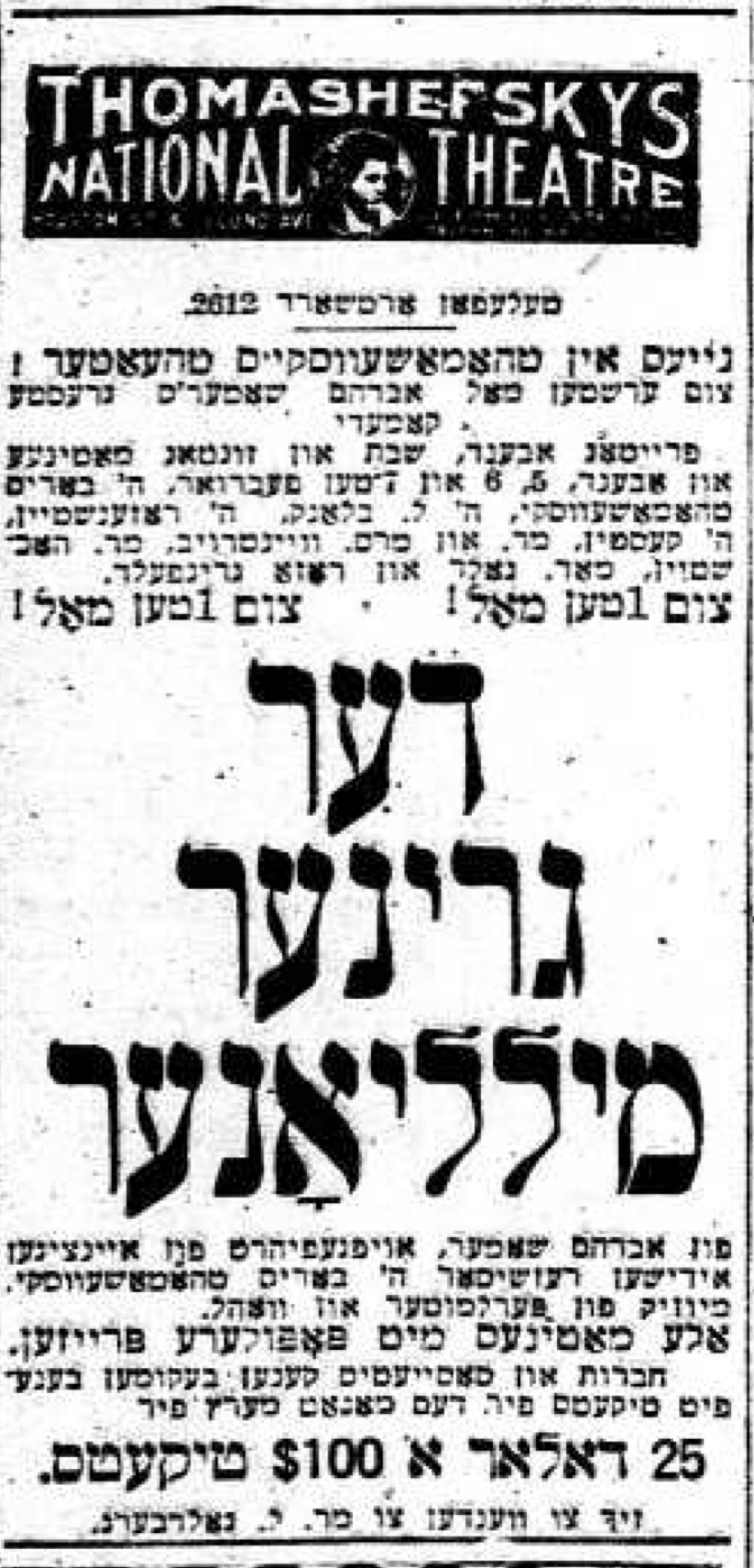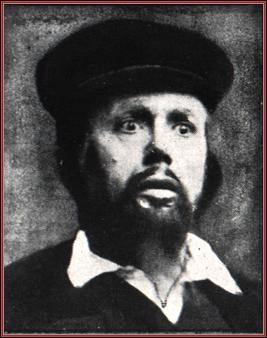42 Performing in Der Griner Milyoner
Published in the Forverts on February 8th, 1947
Abraham Shomer’s Der Griner Milyoner. – Compliments from Sholem Aleichem. Boris Thomashefsky, Leon Blank, and Gershon Rubin
At Thomashefsky’s theater, you never knew what role you’d be cast in next week, or even tomorrow. Thomashefsky never stuck to one style of play. When the operettas that revolved around dances, marches, and songs didn’t go well, he would instead put on a serious drama. And if the serious drama wasn’t successful, he immediately reversed course and went back to putting on operettas.
So we got tossed back and forth from one kind of play to another, when we never knew what we’d end up doing next. And here I have to mention, that even though Thomashefsky was considered an operetta-oriented actor, he very much excelled in serious roles too. He only had to will it, and he would play very well. The truth was that he had a good sense of realism when playing dramas. He could play them naturally and bring the characters to life. But as though he were possessed by some kind of dybbuk, he was inclined to have a haughty and pompous tone, and he felt more at home in a foolish operetta than in a realistic drama.
But perhaps he just wanted to show that, in the theater, he was a “master of everything.”

Among the plays in which Thomashefsky excelled when I played with him over several seasons in the National Theater was Abraham Shomer’s distinguished comedy Der Griner Milyoner. Leon Blank and I were also exceptional in this play. And the interesting thing was that, hearing the comedy read aloud, Thomashefsky wasn’t impressed by it, and neither were other actors in the troupe. People were sure that it would be a huge failure.
The only person who was certain that the comedy was sure to be a huge success was the author himself, Abraham Shomer, the son of the famous novelist Schaikewitz, aka Shomer. He talked about his comedy with such enthusiasm that it infected us all.
This was in the 1915 season1, after a whole series of failures of other plays in the theater. And as usual in such moments, we were ready to try anything - even plays we didn’t really believe would succeed. Everyone was simply tired of all the failures during the previous season. And when Abraham Shomer set the condition that he, not Thomashefsky should direct the play himself, we of course let him take the reins.
Abraham Shomer was a very good director. He had a solid understanding of the theater and a healthy sense of realism and how to perform with a natural tone. He could hold a firm command of the room so that everyone had to obey him during rehearsals, even when they thought that he was wrong. I experienced this myself, and I remember how I argued with him over one scene for a while, but I couldn’t persuade him one bit.
We argued over my role as the smalltown shtetl shadchan, who was a master at achieving the impossible. There was a scene where I run in and, in jubilation, show everyone a picture I received from America. In the picture was a wagon with a cooler2, and a few good horses. In my role as the shadchan, who was also hoping for the opportunity to go to America through a shidduch, made a huge fuss about it and went on and on nonstop in astonishment over the wagon, the cooler, the horses, and the groom, who had become a simple “cooler-man” in America and, in his own imagination, thought he was already a millionaire.
My thought was, because I generally played exaggerated, over-the-top types of characters, I should run in with the picture in my hand. When delivering the line “Jews, come see!”, I should shout it at the top of my lungs, and in nervous excitement I should make such a tumult just as though I were bringing the greatest news possible.

That’s how I interpreted the scene, so that’s how I performed it during rehearsals.
But Abraham Shomer didn’t want me to play it like that.
– We don’t need all this! - he said. - Why all the tumult? Why all the commotion?
He insisted that I should play the scene calmly and casually, and I should behave as though the whole story with the wagon, the cooler, and the horses was nothing special but just a regular thing that there’s no need to get excited about.
He insisted on naturalness. When I pointed out to him that in this role, the excitement was natural, he replied that in fact a more relaxed tone would be more natural here. I thought my interpretation was right and his was wrong, but I couldn’t convince him. Thomashefsky also agreed with me, and he advised to play it in rehearsals the way Abraham Shomer wanted, but in the actual performance to play it the way I wanted.
– Your way will be better! - he said. - And you will see that afterwards, he’ll admit that you were right.
And so that’s what I did.
During rehearsals, I played the scene as Abraham Shomer wanted. But when it came time to perform on stage, I played the scene as I interpreted it, and it really did come out better. It was much more fitting for the shadchan type of character. You could see this much more clearly in the actual performance than during rehearsals. And Abraham Shomer himself also had to admit that I was right.
We enjoyed the show very much. I was very pleased with it, and I was pleased with the role I played in Abraham Shomer’s fine comedy Der Griner Milyoner. And I remember how one time, I was told that the great Yiddish writer Sholem Aleichem was in the audience for a performance3, I was especially excited because I wanted to blow him away more than anyone else would. When I met him after the performance and he complimented me on my acting, it was a very, very important moment for me.
The time I met Sholem Aleichem after that performance is etched forever in my memory. I remember how taken aback I was when he, in his own unique way, told me that I had stolen from him when creating the shadchan character as a “Sholem Aleichem-type” of Jew. But soon I got control of myself and responded with a smile: “Who then should I steal from, if not Sholem Aleichem?” He enjoyed my answer and laughed.
The huge success of Abraham Shomer‘s Der Griner Milyoner was quite the surprise for all the actors in the troupe. And when they recalled how at the beginning they were sure that the play would flop, they said it just goes to show how in the theater you never know what will succeed and what will fail, and whatever happens is no more than coincidence. But the truth was it was no coincidence. The play really was a good one with a healthy sense of humor. It was popular, the plot was natural and flowed well from one scene to the next, and the acting was good. Thomashefsky was brilliant in the role of the “cooler-man.” Leon Blank played the role of the shoemaker better than you could imagine. Gershon Rubin also later excelled in the same role. And as for my performance as the shadchan, the critics’ reviews really pleased me a lot. In private conversations, prominent Jews - among them the likes Dr. Shmaryahu Levin - also complemented my acting.
We ended the season with Der Griner Milyoner, and then over the years it was put on again from time to time. Whenever it was put on, the theater was always packed. Many people came to see the play not once, but two or three times. And I am more than certain that if we had a “repertoire-theater” where we could put on, from time to time, the best plays from the old days, Abraham Shomer’s Der Griner Milyoner would still be a big hit.
But we have a problem in the Yiddish theater - after a play has finished its run, it is hidden away somewhere in a box and never taken out again. And this is a shame, a great shame. Such a fine comedy as Der Griner Milyoner deserves to be staged again from time to time. For the audiences who really love quality Yiddish theater, it would be refreshing, and I feel it is my duty to mention this here.